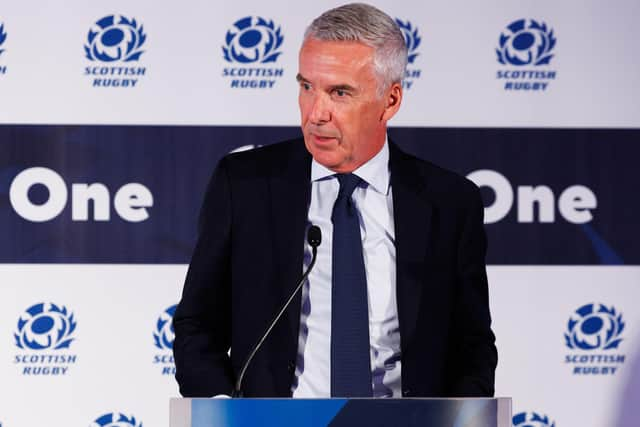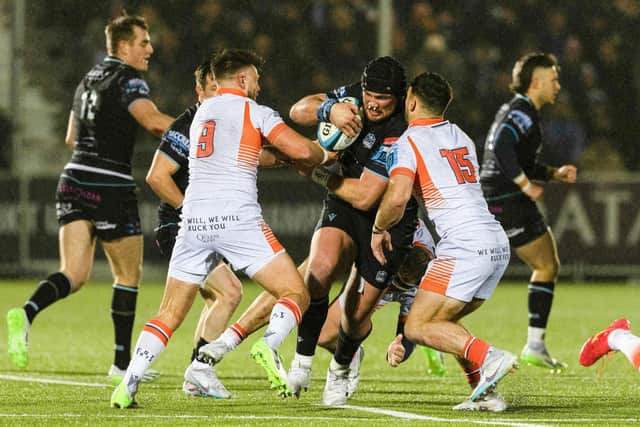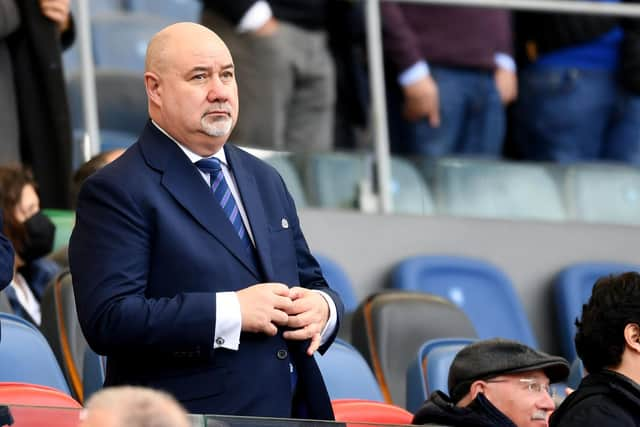Scottish Rugby chief John McGuigan addresses stemming financial losses without ‘cutting and compromising’
Nobody said it was going to be easy and John McGuigan is refreshingly candid when he talks about squaring the circle that is bringing Scottish Rugby’s finances under control without embarking on a round of swingeing cuts which would threaten the ability of Edinburgh and Glasgow Warriors to remain competitive.
Scotland’s only two professional clubs form the wellspring which supplies the national team and plenty has been invested in them in recent years. It’s part of the reason there is a £10 million black hole and McGuigan knows it needs addressed as a matter of urgency.
Advertisement
Hide AdAdvertisement
Hide AdThe 63-year-old was appointed chair of Scottish Rugby last June but now finds himself flying solo at the helm following the resignations of the chief executive, chief financial officer and performance director. He is close to filling the vacancies in the former and latter and it will be left to the new CEO to find the new financial chief to replace Hilary Spence.


In the meantime, McGuigan has outlined his strategy to put Scottish Rugby back in the black, with the warning there will be more pain before it gets better. The governing body reported losses of £10.5m for the financial year to May 2023 and he believes similar figures can be expected this year. That should improve significantly in 2024-25 and by 2025-26 he is hopeful the organisation should be back in profit.
The key is to grow the revenue which reached record levels of £68.3m in 2022-23 but needs to get up to £100m, according to McGuigan, whose CV includes time in financial services with Standard Life and Phoenix Group as well as two years as chief executive of NHS24. “It’s an aspiration to get to £100m from where we are, but it’s not going to be in one leap,” he said. “But we need to get there in order to have a business that can continue to perform, and where we can have the expectations we all want around winning things, having successful professional teams, supporting women’s rugby, making sure we have the right pathways and best coaches. We’ll need £100m to do that.”
Getting there is tricky. There are only so many Scotland home games and Taylor Swift concerts that Murrayfield can host in a year and McGuigan acknowledges that Edinburgh and Glasgow might have to “carry some pain” as he tries to put finances back on an even keel. What he doesn’t want to do is embark on a round of cuts which could destroy the pro teams’ competitiveness or hinder the development of the clubs’ women’s teams which have been attached to each pro franchise. McGuigan wants them to become a key part of the Edinburgh and Glasgow brand.
“I think as we look at the overall spend of Scottish Rugby and the fact that we definitely don’t want to be making losses every year – we definitely don’t want to be doing that so I am putting a stop to that – we need to get back in the black again in terms of our financials – but that is why we need to grow more revenue because I don’t naturally want to inhibit the ability of Edinburgh and Glasgow to perform and be successful,” he said. “That’s why we have attracted the players we have, and the coaches we’ve got at both Edinburgh and Glasgow, so I think it’s incumbent on me to find the money to allow them to become as good as they can be as two pro teams.


“I think they will accept that there is always opportunity for them to make some savings, so they will carry some of the pain as we make immediate changes in our cost profile, but longer term I want to continue to invest in them to ensure that they play the wider part they can play in terms of development of Scottish-registered players, Scottish-qualified players and also development of the women’s game.”
Under Mark Dodson, Scottish Rugby’s outgoing CEO, the pro teams benefited from “turbo charged” investment over the last couple of years in a bid to make them competitive. It hasn’t delivered silverware – yet – but Glasgow are close and Edinburgh are improving under Sean Everitt. McGuigan wants to keep the top stars in Scotland but knows clubs in France and Japan can offer more money.
It’s a challenging market and he needs to box clever. Key to this will be the appointments of Dodson’s successor and a new performance director. Progress is being made on both fronts and once the new CEO is confirmed – probably next month – they will help “play their part” in selecting a new performance director to replace Jim Mallinder who will depart in June after a largely unhappy tenure which has seen the men’s under-20 team relegated to the second tier of the world game and the supply of players to the national side reduced to a trickle.
Advertisement
Hide AdAdvertisement
Hide Ad“I want the CEO to run the business and I want the performance director to run the rugby, and these two things cross over at certain points,” said McGuigan. “For me, if I had to call out two priorities, it would be for the performance director to make sure the pathway stuff really starts to work. My biggest frustration at the moment is that we’ve got a glaring gap in terms of our ability to develop players and we need to sort that, and that’s that person’s job. And the CEO’s job is to work with me and the board to manage the cost base but principally drive more commercial success of the business and grow up the revenue number. There will be lots of other things they have to do, but, for me, those are the two fundamentals.”


So much money has come through Scottish Rugby in recent years that it’s hard to grasp just why the finances have nosedived. Covid was a dark time, with the 2021 Six Nations played out in empty stadiums, but the Murrayfield coffers were swelled by £15m grant from the Scottish Government to help it recover from the pandemic. Then there was the money from CVC, the private equity firm which has invested heavily in rugby. It paid £365m for a 14.3 per cent stake in the Six Nations in 2021 and has also bought into the United Rugby Championship. Again, Murrayfield benefited from these deals and McGuigan offers a blunt response when asked where all the money has gone.
“It’s been spent,” he said. “There are things you can point to. The women’s game is pretty expensive, you’ve got a significant investment in the pro teams. If other [clubs] are on [a budget of] £5m and ours are on £8m, that’s significant. There has been an uplift in player salaries, so you can start to understand where some of the money has gone. That’s okay as long as you’ve got a line of sight towards a future revenue stream that gives you extra confidence about the extra money you’re deploying into things which are effectively day-to-day running costs – not strategic investments. Confidence that you’ve found a revenue stream that allows that to continue for the long term.
“That’s the piece that’s missing in the jigsaw puzzle. How do we get to a place where the revenue stream offsets the fact we will no longer have these opportunities through CVC and government grants? That’s the piece we’ve got to fix, that’s the piece that’s very urgent and why we are sitting with losses every year. We’ve been running a business hot in terms of costs, with an underlying revenue stream that doesn’t support that level of costs.”
So is it credible to increase the revenue by £30m, pushing it towards the magical £100m figure? "It’s what we need in order to succeed, otherwise it will be constantly cutting and compromising,” said McGuigan. “Is that the game we want to be in? It can’t be. We’re here to be ambitious, expansive and the best nation we can be. I don’t know any other nation that’s done that on the back of just cutting costs. We do need to find the revenue to do it.”
Comments
Want to join the conversation? Please or to comment on this article.
